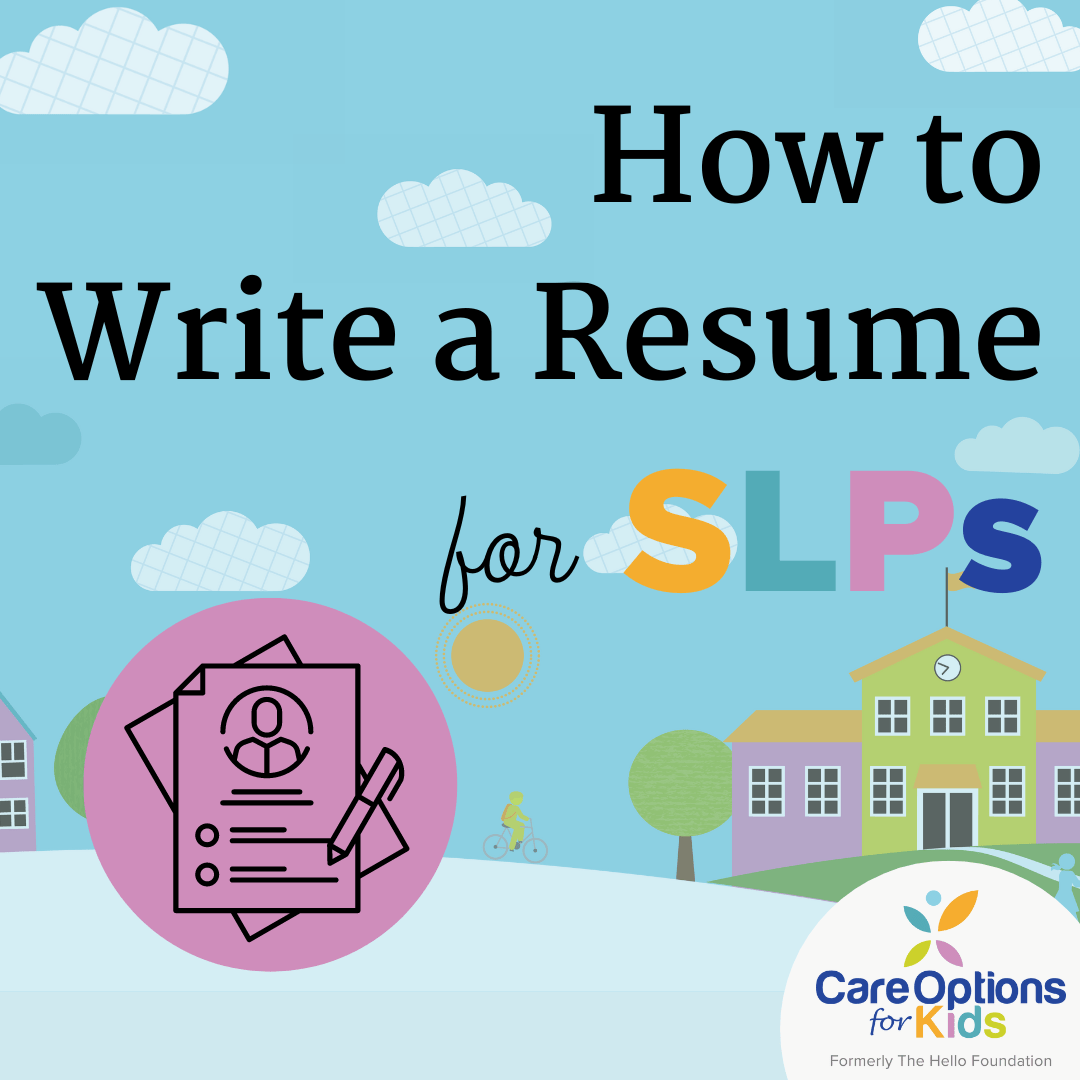If you want to land your dream Speech-Language Pathologist (SLP) job, an outstanding resume is the best way to secure it. In our increasingly digital world, your resume serves as your greeting, handshake, and chance to show your value to employers at a glance. You won’t get the interview if your resume doesn’t adequately or accurately portray you. Your resume must showcase your academic achievements, practical skills, experience, and commitment. In this blog post, we’ll break down the essential components of a stellar SLP resume and provide some valuable tips to help you stand out in a competitive job market.
Start with a Strong Objective Statement
Start your resume with a compelling objective statement that communicates your career goals and passion for this field. You should tailor this section to the job you’re applying for, including researching the role and your potential employer. You must also emphasize your commitment to the well-being of your clients.
Example:
Dedicated and licensed speech-language pathologist with a strong background in pediatric speech disorders. Seeking a challenging position in a dynamic healthcare setting to utilize my expertise in assessment, diagnosis, and treatment planning to improve the lives of children with communication challenges.*
Highlight Your Educational Background
You should detail your academic achievements and relevant coursework in the education section. Include the name of your school, the degree you earned, your graduation date (or expected date), and any relevant honors or awards you received there.
Example:
Master of Science in Speech-Language Pathology, XYZ University, [Month, Year]
Bachelor of Arts in Communication Sciences and Disorders, ABC College, [Month, Year]
Emphasize Clinical Experience and Internships
Your hands-on experience will set you apart. Highlight your practical experience and clinical internships, including detailed settings you worked in (schools, hospitals, and clinics) and the demographic you served (children or adults). Focus on the specific skills you developed during these experiences, such as assessments, treatment planning, and collaboration with interdisciplinary teams.
Example:
Clinical Intern, Speech-Language Pathology Clinic, XYZ Hospital
- Conducted comprehensive speech and language assessments for pediatric and adult populations.
- Developed individualized treatment plans and implemented evidence-based interventions.
- Collaborated with occupational therapists, teachers, and parents to ensure a holistic approach to patient care.
Showcase Specialized Skills
Show off your specialized skills! SLPs possess a diverse set of skills, so make sure to include these, so you can stand out. These include diagnostic evaluations, therapeutic techniques, and proficiency with assessment tools. Create a skills section that highlights a mix of your technical and soft skills. Be specific about your expertise in augmentative and alternative communication (AAC), fluency disorders, or voice disorders.
Example:
Skills
- Articulation and phonological disorders
- Augmentative and alternative communication (AAC)
- Fluency disorders (stuttering)
- Voice disorders
- Dysphagia assessment and treatment
Quantify Achievements and Impact
Numbers talk. Use as many quantifiable metrics as possible to back up your work. Quantifiable metrics demonstrate the impact of your work and provide concrete data that adds credibility to your resume, whether it’s the percentage improvement in a client’s communication skills or the number of successful therapy sessions conducted.
Example:
Achievements
- Improved articulation scores by an average of 20% through targeted therapy interventions.
- Conducted over 500 individual therapy sessions for children with language disorders, resulting in measurable progress in communication skills.
Include Professional Memberships and Certifications
Membership in professional organizations and certifications can add a lot of credibility to your resume. You’ll want to highlight affiliations with relevant associations, such as the American Speech-Language-Hearing Association (ASHA). Include information about your Certificate of Clinical Competence (CCC) if applicable.
Example:
Professional Memberships
- American Speech-Language-Hearing Association (ASHA)
- State Speech-Language Pathology Licensure, [Your State]
Demonstrate Continuous Learning
The field of speech-language pathology is dynamic, with new research and interventions constantly coming through. You should showcase your commitment to professional development by listing relevant workshops, conferences, or additional coursework you have completed. This shows you are really serious and interested in this field.
Example:
Professional Development
- Attended ASHA Annual Convention [Year], focusing on the latest advancements in pediatric speech therapy.
- Completed advanced training in augmentative and alternative communication (AAC) techniques.
Tailor Your Resume for Each Job Application
You’ll need to customize your resume for each job application. Do this by aligning your skills and experiences with the specific requirements outlined in the job description. Use the keywords to ensure your resume passes through applicant tracking systems (ATS) and reaches the hiring manager’s desk. An applicant tracking system, or ATS, is a program that scans your resume for keywords and criteria that the employer is looking for.
Example:
Objective
Passionate Speech-Language Pathologist with a proven track record in pediatric speech disorders seeking an exciting opportunity at [Hospital/Clinic Name] to contribute expertise in assessment, diagnosis, and evidence-based treatment.
Crafting an effective resume is a crucial step toward building a successful career. You will present yourself as a top-tier, well-rounded candidate by showcasing your education, clinical experience, specialized skills, and commitment to professional development. Most importantly, remember to tailor your resume for each application. Don’t hesitate to seek feedback from friends, mentors, or colleagues to ensure your resume stands out. With a well-crafted resume, you’ll be on your way to making a positive impact in the SLP job of your dreams.
Join the Care Options For Kids Team!
Are you ready for meaningful work that comes with benefits and not burnout? Join the compassionate care team that helps children and families live their best lives. Our clinicians provide best-in-class pediatric nursing, therapy, and school-based services. We bring individualized care to children where they live, work, and play. We have opportunities in homes, schools, and clinics across the country.
Apply at Care Options for Kids now. We make it easy to get started, so you can begin making a difference as soon as possible.






